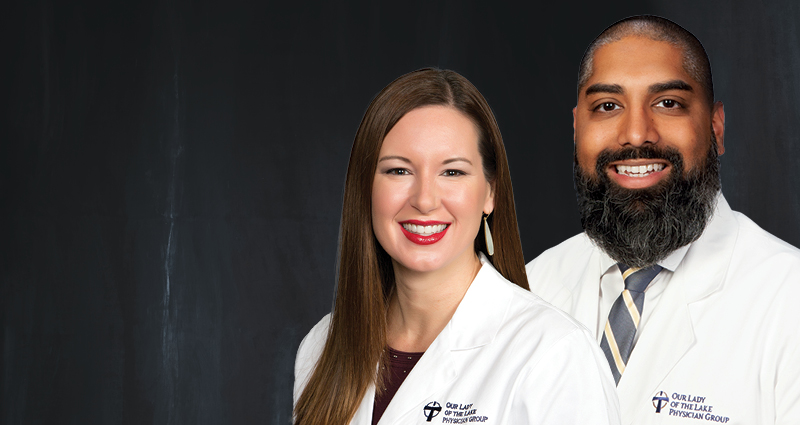If you think a colonoscopy is bad you really don’t want colon cancer.
Thankfully, with regular screenings most colon cancer can be prevented. Colonoscopies can also help with other non-cancerous digestive conditions.
Kelly Finan, MD, and Asif Talukder, MD, Board Certified colon and rectal surgeons with Our Lady of the Lake Health, continue our conversation about colon and rectal health. They share their insights on colorectal health, cancer prevention, treatment, patient-centered care and more.
An Ounce of Prevention
Regular screenings are crucial to prevent colon cancer and to catch this slow-growing cancer early.
Colonoscopies should begin by age 45 or earlier if you have additional risk factors, such as a first-degree family member with a history of colon cancer. In that case, screenings would start when you’re 10 years younger than they were before their diagnosis.
A colonoscopy is repeated once every 10 years for most patients, as it takes about that long for a polyp to become cancer. However, if polyps are found or you have a family history you may have more frequent colonoscopies.
Patients in the Baton Rouge region can learn about their personal risk with our colorectal cancer risk assessment.
Demystifying Colonoscopies
Despite common misconceptions, colonoscopies are generally not painful. You’ve likely had bowel movements bigger than the scope used in the procedure. Sedation is provided to ensure comfort, and the team works closely with patients to accommodate their preferences and minimize discomfort.
The evening before the procedure is the most difficult part. Although no one asks for refills on the laxative medication for preparing the bowel for a colonoscopy, it is a necessary evil. Nothing can be seen with a colon full of stool.
Detecting cancer is just one reason to schedule your colonoscopy. Additional benefits include early detection of other conditions, evaluation of symptoms and polyp removal to prevent their growth into cancer.
Treating Common Colorectal Issues
Much of Dr. Finan and Dr. Talukder’s work is treating benign, non-cancerous colon conditions such as irritable bowel disease, abdominal pain, fissures, Crohn’s disease, diverticulitis and hemorrhoids. While most cases can be managed through outpatient treatments or dietary adjustments, some may require surgical intervention for symptom relief and improved well-being.
Hemorrhoid removal surgery can lead to higher quality of life, although such a procedure includes about a three-week recovery. Getting people up and walking sooner after surgery leads to better recovery, which is a key strategy to improve patient outcomes.
Why Accreditation Matters
The colorectal cancer multidisciplinary team at Our Lady of the Lake Health is accredited by the NAPRC — National Accreditation Program for Rectal Cancer, a quality initiative developed by the American College of Surgeons. As one of the first 15 programs in the U.S. to earn this distinction and the only one accredited in Louisiana, Our Lady of the Lake provides the highest quality of care available for patients with colorectal cancer.
This care translates to more high-quality years of life for patients, and the team’s outcomes are excellent. Their approach to patient care includes a nurse navigator as part of the suite of services and intentional work to overcome any barriers. Screening for and addressing social drivers of health is a standard part of the care provided by our health system.
The team’s approach allows them to be at the forefront of research opportunities and the latest technologies, such as immune therapies, genetic testing and advanced imaging.
Healthier Lifestyle Choices
In addition to specialized care, patients are encouraged to take a comprehensive approach to their overall health and well-being. Adopt healthy lifestyle choices such as smoking cessation, weight management and regular exercise. These habits contribute to reducing the risk of colorectal issues and enhance overall well-being.
A key lifestyle change that can improve digestive function is increasing fiber and water intake. About half of anal and rectal problems are poor function, and fiber and hydration can help keep you from needing specialty colorectal care.
Listening to Understand
Colorectal conditions are very personal and sometimes may be uncomfortable for patients to talk about. Active listening and comprehensive patient assessments are key for specialized colorectal care. By understanding their fears, concerns and symptoms, Dr. Finan, Dr. Talukder and the entire team provide personalized care tailored to each patient’s unique needs.




